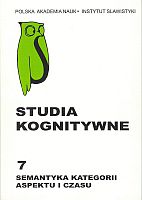SUBJECT in the Meta-Informative Centering Theory
SUBJECT in the Meta-Informative Centering Theory
Author(s): André Włodarczyk, Hélène WłodarczykSubject(s): Language and Literature Studies
Published by: Instytut Slawistyki Polskiej Akademii Nauk
Summary/Abstract: The problem of subject will be dealt with in the framework of our metainformative centering theory3 which enables us to build models of how information is linearised and expressed in human languages. This theory is based on several assumptions. (a) Linguistic messages are always partial with respect to reference: when communicating something about a situation in the world, speakers choose a point of view about it and communicate explicitly only this point of view. The whole situation must be completed by the hearer on the basis of his knowledge both of that of the speech-act situation and that of the world in general. (b) Two different levels must be distinguished: informative and meta-informative. As a matter of fact, what is usually called by linguists informative structure concerns rather the way information itself is conveyed through linguistic messages. By information, we thus mean the semantic relational content of utterances: this concerns situation frames4, their participants and spatio-temporal anchoring. Meta-information concerns the way information is ordered5: to achieve the ordering of non-linear representations as texts (sequences of linguistic utterances), the speaker must select a centre of attention (henceforth CA) and “predicate” about it. Hence, in our centering theory, the term “predicate” is reserved for the meta-informative level and is used in its initial Aristotelian sense
Journal: Cognitive Studies | Études cognitives
- Issue Year: 2006
- Issue No: 7
- Page Range: 39-64
- Page Count: 26
- Language: English

